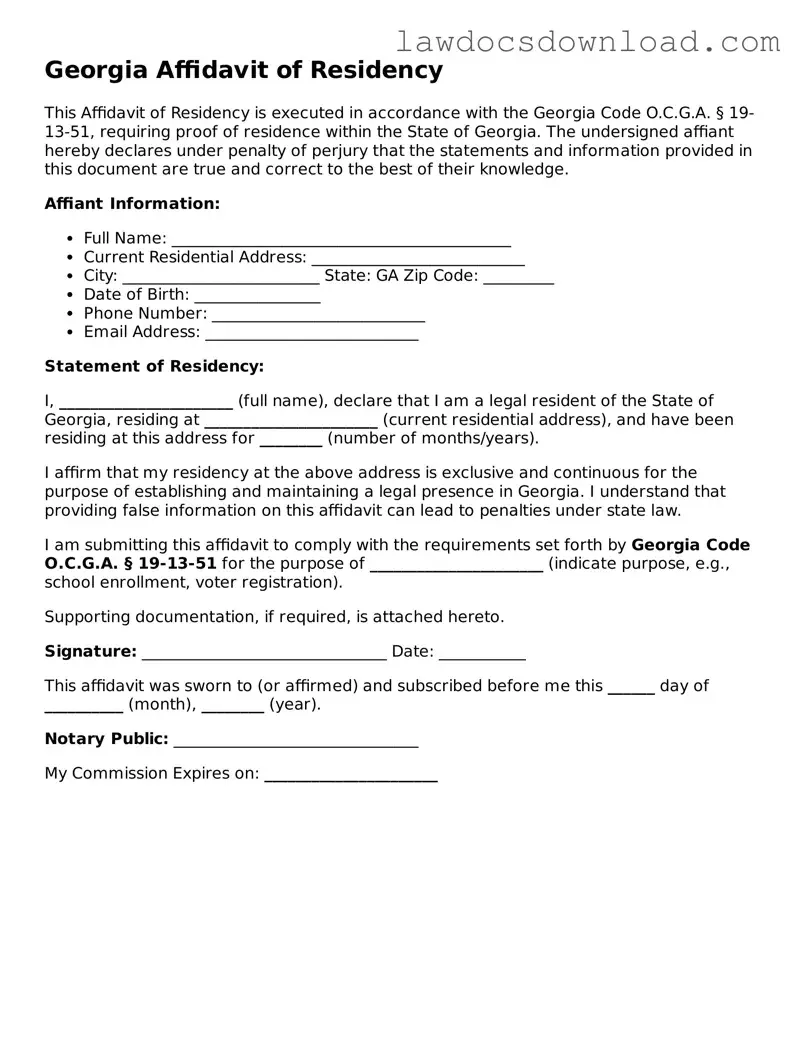Completing the Georgia Affidavit of Residency form is a crucial step for many purposes, such as enrolling children in school or applying for certain state benefits. However, some common errors can hinder the process. Recognizing these mistakes in advance can ensure the affidavit is accepted without delays.
One common mistake is not filling out the form completely. Every section of the Georgia Affidavit of Residency form is important. Leaving sections blank can raise questions about the validity of the residency claim. It's crucial to provide full answers to every question asked on the form to avoid unnecessary complications.
Another error is providing incorrect information. Whether it's a simple slip, like a typo in a date or address, or incorrectly listing the names of those residing at the address, inaccuracies can lead to the rejection of the form. Double-check every entry to ensure it matches official documents and records accurately.
Some applicants forget to include supporting documentation. The affidavit requires proof of residency, such as utility bills, rent receipts, or a lease agreement. Submitting the affidavit without these can delay the verification process. Ensure all required documents are attached and that they are current and clearly legible.
Not having the affidavit notarized is another common oversight. In many cases, the Georgia Affidavit of Residency must be signed in front of a notary public to be considered valid. Skipping this step can render the document unofficial, necessitating a repeat of the process.
A significant error is failing to update the affidavit when moving. Residency status can change, and it's essential to submit a new affidavit reflecting your current address and living situation. Using outdated affidavits can lead to issues with services that rely on current residency information.
Mistakenly using the wrong form is an error that can easily be avoided. Georgia might have different versions of residency forms depending on the specific requirement or agency. Always verify you're completing the right form for your particular needs to prevent the delay of your application.
Signing the affidavit before it's completely filled out is a mistake that can lead to difficulties. Some residents fill out their personal information and sign the document, planning to complete the rest later. This can cause problems, especially if the signature date does not match the date of the document's completion.
Using pencil or erasable ink to fill out the form is not advisable. Documents completed in pencil may be considered unofficial or easily altered, leading to questions about authenticity. Always use black or blue ink for a clear, permanent record.
Another frequent slip-up is failing to disclose all residents living at the address. The affidavit asks for a list of all individuals residing at the property, and omitting someone can appear as if you're withholding information, even if unintentionally. Make sure to include every resident to accurately represent your living situation.
Last but not least, not reviewing the form for errors before submission is a common oversight. A quick review can catch simple mistakes or omissions that could significantly delay processing. Taking a few moments to double-check your information can ensure a smoother submission process.
By being aware of these mistakes and taking steps to avoid them, individuals can ensure their Georgia Affidavit of Residency form is completed accurately and efficiently, facilitating a smoother path to securing their required services or benefits.

